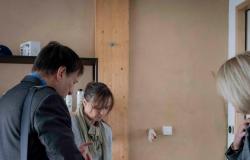With the “Airbnb law”, deputies adopted this Thursday a text which is of particular interest to residents of French tourist regions, but all municipalities in France will be able to take it up. The bill had been in the pipeline for almost two years, it had been suspended with the dissolution of the National Assembly and it was finally adopted by the senators then the deputies after some compromises. “It is a text for the French, for all those who are looking for long-term housing and who are unable to find accommodation”underlined, during the debates in the Senate, the Minister of Housing Valérie Létard.
What does it predict the text of the law carried by a socialist deputy from Pyrénées-Atlantiques, Iñaki Echaniz, and a Renaissance deputy from Finistère, Annaïg Le Meur voted successively by the Senate and the National Assembly? France Bleu explains.
A “toolbox” to regulate furnished tourist accommodation
“All municipalities will be able to set up quotas for furnished tourist accommodation, designate areas reserved for the construction of main residences or even lower the maximum number of days of tourist rental of main residences between 120 and 90 days, among other measures”, welcome the two deputies who introduced the text of the law. Platforms like Airbnb and Abritel, which have grown in recent years, are particularly targeted by the legislator.
The general idea of the text is to limit the tax advantages granted to certain owners of tourist accommodation and to facilitate the task of local authorities who try to regulate things at home. Iñaki Echaniz and Annaïg Le Meur talk about “give mayors a real toolbox to effectively regulate furnished tourist accommodation, the development of which has sometimes become uncontrollable, and to encourage permanent housing.” All municipalities can take advantage of it “regardless if they are in a tense territory or not”, clarified Annaïg Le Meur at France Bleu Breizh Izel.
Tax benefits revised downwards
After the discussions held in the Assembly, the Senate and the joint committee (seven deputies and seven senators), the “tax niche” associated with furnished tourist accommodation remains in force, but it has been reduced. Until now, it was much more advantageous to rent furnished tourist accommodation than traditional accommodation. With this law, the rules change a little.
Currently, depending on the comfort of the accommodation, the reduction rate for tourist rentals can vary from 50 to 71%. With article 3 of the law, the rules are more harmonized from one accommodation to another. For renters of classified tourist accommodation (i.e. those which have specific comfort equipment) and guest rooms, the tax reduction will be 50%. This advantage will be limited to rental companies whose revenue does not exceed 77,700 euros. For owners of furnished tourist accommodation, there will be a 30% reduction up to 15,000 euros in revenue.
Annaïg Le Meur and Iñaki Echaniz are counting on the finance bill to defend “the need to align taxation between the long and short term by increasing the reduction on bare rental (Editor's note, for which the duration of the lease is a minimum of three years)”.
A mandatory energy diagnosis
Among the other measures in the text, article 1 provides for requiring owners to carry out a energy performance diagnosis (DPE). This was not the case for the moment even though it is essential for an owner who rents year-round. In other words, until now, there was every interest in renting a tourist accommodation, not only for tax reasons, but also because there was no obligation to renovate it if it was a thermal sieve.
Quotas and zones reserved for main residences
On the other hand, local authorities should have more leeway to regulate within their territory. For example, they will be able to more easily set up quotas (as is the case in Saint-Malo) or compensation (the Basque Country agglomeration is experimenting with it since March 2023). Municipalities will also be able to reserve certain areas for main residences and include it in their local town planning plan (in municipalities with more than 20% second homes or in municipalities in tense areas). They will also be able to reduce from 120 to 90 days per year the maximum period during which a main residence can be rented to tourists.
Finally, the owners of furnished tourist accommodation would be forced to officially declare to local communities. For the defenders of the bill, the current vagueness prevents us from having real visibility on the supply of furnished tourist accommodation.
The multinational Airbnb reacted a few minutes after the adoption of the text to emphasize that it collaborates “already with more than 350 cities across France on proper compliance with local rules, and we wish to work with more municipalities to implement proportionate and effective measures, in areas where the problems are clearly identified.” As for the tax component provided for by law, Airbnb asserts “regret the addition of new tax and administrative constraints which will weigh heavily on French families wishing to occasionally rent their accommodation.”






